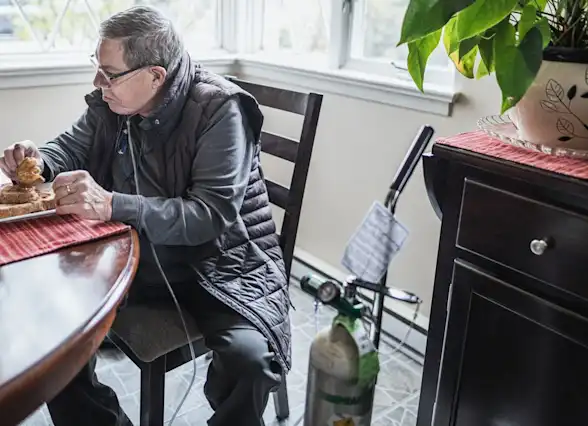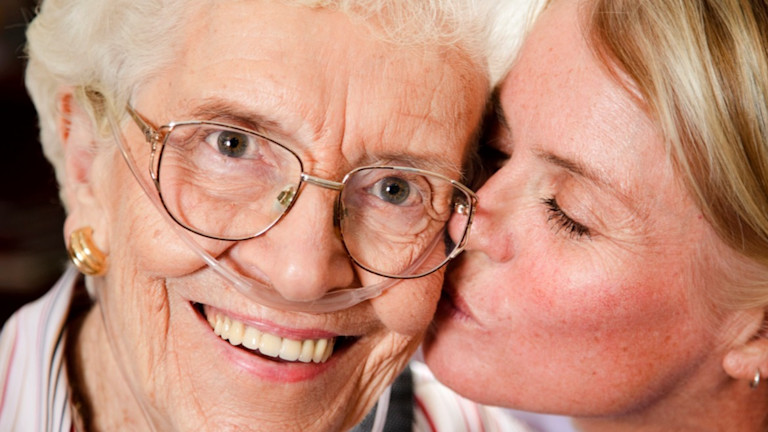End Stage COPD
Most chronic diseases have what's considered an end stage. This is the final and worst stage of the condition, and is now life-limiting.
Get insurance benefits, legal documents, and medical records in one place

Helpful Highlights
Don't turn fear into frustration.
Recognizing end-stage COPD and what to expect next.
Treatment for end-stage COPD and alternative options.
Your loved one’s provider determines that COPD has now reached Stage 4 (very severe), which is life-limiting. Meaning, all else being equal, complications from COPD will bring about the end of life. About 25% of people with severe COPD will die within 2 years of diagnosis, and more than half by four years, though some people with Stage 4 COPD have lived upward of 20 years.
If you know what to expect and discuss care options with the provider, you can be integral to your loved one's acceptance of the change in COPD status and help them make important decisions regarding self-management, continued treatment, and end-of-life.
What is end-stage COPD?
End stage (Stage 4) COPD is the final stage of the disease and is life-limiting. Most people reach Stage 4 after years of living with the disease and the consequent lung damage. End-stage COPD can, and often does, result in lowered quality of life and increased frequency and/or severity of exacerbations (a.k.a. flares). COPD is the 6th leading cause of death in the U.S.
What can you do for your loved one?
Listen and support your loved one’s decisions; offer suggestions, when asked, not demands.
Observe for subtle changes in demeanor or physical well-being and report the changes to the provider.
Encourage your loved one to talk with friends, family, and the medical team about end-of-life care. This is not an easy topic to talk about, usually for family more than the individual, but studies show that the sooner discussion and planning commence, the better the care provided. This can be comforting for both you and your loved one.

Some strategies that may help open dialogue with your loved one:
Talk about emotions. It is normal to feel angry, afraid, or both. Discussing these emotions may help you and your loved one connect and feel some relief.
Discuss life. Talk about the legacy your loved one wants to leave, the lessons they want to share, and the love they hope endures.
Talk to people who have experience with end-of-life. Hospice providers, religious leaders, and others who have been present for many deaths have a different perspective on dying than family and friends.
Religious rituals. Depending on your loved one's religion, they may want to talk with a religious leader about end-of-life spiritual matters and death rituals.
Get affairs in order. If possible, people with end-stage COPD should ensure that their will or trust is up to date and that their wishes as they approach end-of-life are known (commonly called advanced directives). Pre-arrangements for funeral and burial or cremation reduce the costs and anxiety that often accompany "the business of dying."
Support groups and therapy. The emotions associated with being near the end of life can be overwhelming and too enormous to process alone. Consider seeking the help of a grief counselor or therapist who specializes in such situations, and support groups for those who have lost loved ones to terminal diseases.
Prognosis for end-stage COPD
COPD affects everyone differently. With proper treatment, the disease - even severe - doesn't have to be an imminent death sentence.
When hospitalization is necessary, the short-term outlook depends more on the severity of the exacerbation than the severity of the COPD itself. In the long run, however, it's the severity of the COPD that determines the prognosis and what can be expected.
During late-stage COPD, exacerbations are more severe, often resulting in hospitalization until the exacerbation is resolved. Although your loved one will get a little better between exacerbations, they likely will not return to their previous health status. Their health status will decline a bit with every exacerbation.
Symptoms of end-stage COPD
Many of the symptoms in earlier stages of COPD, like coughing, mucus, shortness of breath, and tiredness will get worse. Breathing will take a lot of effort and they may feel breathless even while at rest. Exacerbations will happen more often and will likely be more severe. It’s hard for them to eat and nearly impossible to exercise or even engage in prolonged activity. Eating will take much more time and tasks need to happen in short bursts. Additionally, as COPD gets more severe, respiratory infections are more likely.
Recognizing the symptoms of end-stage COPD can facilitate coping, enable them to express important parting words to loved ones, make peace in their lives where they feel it's needed, seek hospice care, and discuss final plans.
Treatments for end-stage COPD
The provider will often use the same treatments as in earlier stages, though in different doses and combinations, and the frequency of dosing may increase.
Surgery for advanced COPD
There are surgeries available for severe COPD, typically used in people who don't respond to medications. The surgeries do not cure COPD and they do not prolong life. They are intended to relieve symptoms (i.e., make breathing easier) and increase the quality of life remaining. These surgeries only help a small number of people.
Other Care Options
Other care options include palliative care, as well as hospice care in the final months of life. Palliative and hospice care services prioritize comfort and quality of life and provide significant support during end-stage COPD, working to reduce symptoms whenever possible. These services also support the family accompanying their loved one on the end-of-life journey.
During palliative and hospice care, you and your loved one will work with an entire care team to:
Set goals for care
Make medical decisions based on those goals
Get support for body, mind, and spirit
Address the needs of family members and caregivers
Many people with terminal conditions find significant and meaningful help in hospice care. Hospice provides end-of-life care that focuses on comfort, dignity, and finding peace.
For some people, anxiety around death is more painful than the physical discomfort of COPD. A person might worry about their legacy, their family, their spiritual status, or whether they have lived a good life.
RESOURCES
COPD.com – Understanding COPD Stages & Progression
Global Allergy & Airways Patient Platform (GAAPP) – Four Stages of COPD
No content in this app, regardless of date, should ever be used as a substitute for direct medical advice from your doctor or other qualified clinician.
Get more support and guidance on insurance benefits, medical records and legal forms.
Helpful brings together your insurance benefits, legal documents, and medical records in one personalized place — so you always know what you have, and never have to search again.

Technology for Health Tasks. Mental Health for the Tough Stuff.
Helpful connects your medical records, insurance, and caregiving tasks automatically. And when you need more than logistics, a therapist is here to guide you.
In-Network and Covered
For Individuals, Couples and Families
HIPAA Compliant, Data Stays Private


Healthcare Tasks Simplified

From syncing records to spotting drug interactions, Helpful does the heavy lifting, turning complex health info into clear tasks and showing you benefits you can actually use, giving you clarity and control over your care.

In-Network Mental Health

Our licensed therapists are here to support you and your loved ones through stress, burnout, and life’s hardest moments, with an inclusive, compassionate approach that works with most insurance plans.

Create Legal Documents

Plan ahead by creating will, trusts, advance directives and more, that ensure your wishes are honored in the event you can’t speak for yourself -with Helpful guiding you every step of the way.